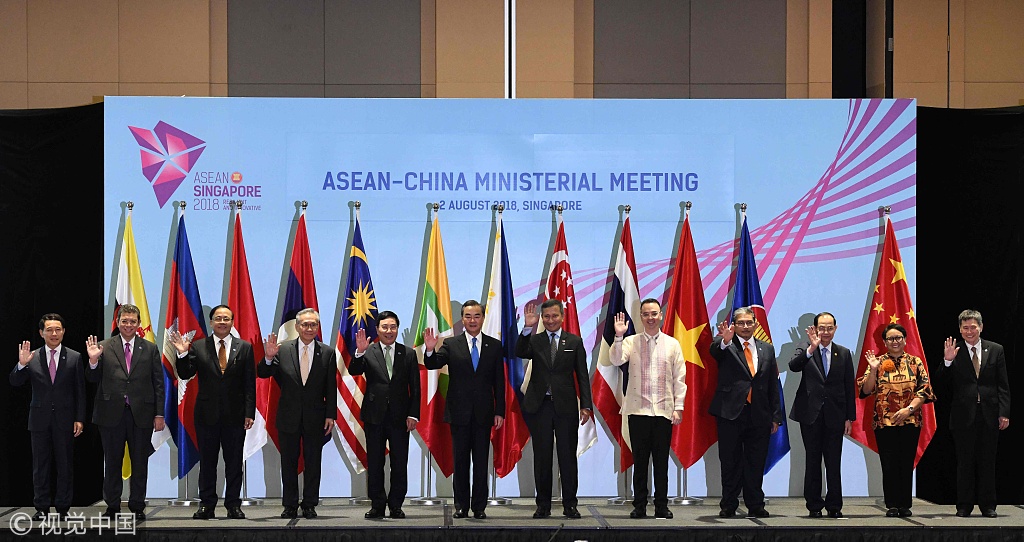Constructive engagement key to South China Sea stability: China Daily editorial


China's Foreign Minister Wang Yi (6th from L) poses with Ministers of Foreign Affairs from other ASEAN countries during a bilateral meeting at the 51st Association of Southeast Asian Nations (ASEAN) Ministerial Meeting in Singapore on Aug 2, 2018. [Photo/VCG]
Summing up his impressions of the foreign ministers meetings on East Asia cooperation that just concluded in Singapore, chief Chinese diplomat Wang Yi highlighted a sharp contrast: a "very successful and smooth"10+3 session and a 10+8 session that displayed "some negative tendencies".
The 10+3 mechanism convenes the 10 ASEAN member countries and China, Japan and Republic of Korea. The 10+8 incorporates Australia, India, New Zealand, Russia and the United States with the 10+3.
Wang's appraisal highlighted that as countries in the region press ahead with cooperation and seek to ensure peace and stability in the South China Sea, some "extra-regional countries"constitute a threat to the entire region.
In a break from a previous convention, where Beijing avoided identifying any offending party, Wang on Saturday identified the US as the "foremost driver of the region's militarization", criticizing Washington for saber-rattling by frequently sending large-scale strategic weapons into the region. Accusing China of militarizing South China Sea, Wang said, is "calling white black", Beijing is only acting in a defensive manner under corresponding pressure.
As with the ongoing tit-for-tat actions between China and the US on trade, the exchange of words surrounding allegations of militarization may escalate. But a solution can hardly be found without addressing a deeper problem: The traditional geopolitical paradigm is increasingly incompatible with changing conditions, worsening major-country relations and the amplifying of strategic misperceptions.
In his separate talks with US State Secretary Mike Pompeo and Australian Foreign Minister Julie Bishop, Wang again elaborated on Beijing's position, and urged the latter parties not to misread its intentions. This may be easier said than done. But it is essential if there is to be constructive engagement.
And whether or not that engagement materializes will determine whether the waters become a highly charged crucible for major-power contention, or a new venue for collaboration.
The present tensions over the South China Sea and the broader region have much to do with the concerned parties viewing the South China Sea through the Cold War-era concept of sphere of influence.
Since each of them claims a commitment to peace and stability of the region, what matters then is how they actually behave.
The most revealing immediate test is how countries respond to the latest positive developments seen in Singapore at the meetings, whether they facilitate their fruition of those developments or hinder them.
MOST POPULAR
- 1 China to give visa-free treatment to another 9 countries
- 2 China fully opens manufacturing sector to foreign investors in landmark opening up move
- 3 China's import expo attracts record-breaking participating countries, exhibitors
- 4 China's door opening even wider to foreign visitors, businesses
- 5 China revises rules to ease foreign strategic investment in listed firms
Editors' Picks
 Video:
Peru sees new port open
Video:
Peru sees new port open
 Infographic:
China's public holidays for 2025
Infographic:
China's public holidays for 2025
 Infographic:
Basic facts of APEC
Infographic:
Basic facts of APEC
 Infographic:
Wrapping up the 7th CIIE: Data recap
Infographic:
Wrapping up the 7th CIIE: Data recap



